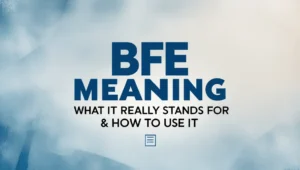If you’ve stumbled upon the word carino and wondered what it really means, you’re not alone. Whether you saw it in a romantic message, heard it in a movie, or read it in a Spanish text, this simple word carries a surprisingly deep emotional meaning. In Spanish-speaking cultures, carino is more than just a sweet nickname—it’s a powerful expression of warmth, care, and emotional closeness. In this article, we’ll dive into the meaning of carino, explore its different uses, and also look at some polite alternatives you can use in various social settings. Whether you’re learning Spanish, traveling, or just want to connect with people more meaningfully, understanding this word will open new doors of communication and culture for you.
What Does Carino Mean?
Carino, often spelled with the Spanish letter “ñ” as cariño, is a noun that translates to “affection,” “sweetheart,” or “darling” in English. It comes from the Latin word carus, meaning “dear” or “beloved,” and it has evolved into a widely used term in modern Spanish.
In everyday speech, carino can express different levels of fondness depending on the tone and relationship between speakers. It can be romantic, familial, or simply friendly. For example, a mother may use it to refer to her child, a partner might use it in an affectionate text, or even a shopkeeper might say it to a regular customer as a polite gesture.
It’s a word that instantly softens a sentence and adds emotional warmth. And that’s the beauty of it—it’s short, simple, and full of love.
How Carino Is Used in Real Life
The usage of carino is incredibly flexible, and it often depends on tone and familiarity. You might hear someone say, “Hola, cariño,” as a greeting to a loved one. This could mean “Hi, sweetheart” or “Hey, darling,” depending on the context.
In written communication, especially in letters or notes, you might see a phrase like “con mucho cariño,” which means “with much affection.” This is commonly used when signing off a warm letter to a friend or family member.
Another popular expression is “te tengo mucho cariño,” meaning “I have a lot of affection for you.” This is a great way to express love or emotional attachment without necessarily being romantic.
One of the reasons carino is so widely loved is because it works across generations and relationships. Grandparents say it to grandchildren, friends use it jokingly, and lovers whisper it softly. It’s intimate but not always romantic, which is what makes it special.
When Carino Might Be Too Much: Polite Alternatives
While carino is beautiful and versatile, there are situations where it might be considered too familiar. For example, in a formal business setting, calling someone carino might feel inappropriate or unprofessional. So what can you say instead?
If you’re looking for more neutral or polite alternatives, try using amigo (friend) or amiga when speaking casually. For more formal interactions, words like estimado or estimada (esteemed) are commonly used in written communications, like emails or business letters.
When addressing someone you care about but want to keep things respectful, you might say querido or querida, which translate to “dear.” These are often used in the openings of letters, such as “Querido Juan” or “Querida María.”
In very formal situations or when addressing someone older, it’s safest to use Señor or Señora, which are equivalent to “Mr.” and “Mrs.” This shows respect without being too personal.
In informal settings where friendliness is encouraged but intimacy is not implied, people sometimes use compadre or comadre, especially in Latin American countries. These words can roughly be translated to “buddy” or “pal.”
Cultural Sensitivity: Where and When to Use Carino
In many parts of the Spanish-speaking world, especially Spain, using affectionate language like carino in public or casual interactions is very common. You might hear a barista say it to a customer, or someone might use it in passing with a stranger just to be warm or polite.
However, in other places—particularly more conservative regions—it can come off as overly familiar or even flirty if used out of context. That’s why it’s important to pay attention to the setting and the nature of your relationship with the person you’re speaking to.
In Latin America, for example, people are often warm and expressive, but social norms still apply. A teacher wouldn’t typically call a student carino unless there’s a close or parental relationship. Likewise, a coworker wouldn’t usually use it unless there’s a long-standing friendly rapport.
The key is to match the level of affection to the situation. Use it warmly, but wisely.
Summary of What You’ve Learned
- Carino is a Spanish word that expresses love, affection, or kindness.
- It’s commonly used between lovers, friends, and family members.
- While beautiful, it’s not always appropriate in formal or unfamiliar settings.
- Alternatives like amigo, querido, or estimado can be used depending on context.
- Culture and tone matter—what’s affectionate in one country might be too forward in another.
Unique FAQs About Carino
1. Is carino always romantic? No, carino can be romantic, friendly, or familial. It depends on who’s saying it and how it’s used.
2. Can I use carino in professional settings? Generally, no. It’s too informal for professional environments. Stick to formal greetings like Señor or Estimado.
3. What’s the difference between carino and mi amor? Mi amor is usually romantic and means “my love,” while carino is more flexible and can be platonic.
4. How do you pronounce carino correctly? It’s pronounced kah-REE-nyo, with a soft “ny” sound from the “ñ.”
5. Is there a feminine version of carino? Not exactly. Carino is gender-neutral, but some people playfully use cariña when speaking to a female, though it’s not officially recognized in the dictionary.
Conclusion
Carino is one of those rare words that transcends language and touches the heart. It’s soft, emotional, and rich in meaning, making it a favorite among native Spanish speakers and language learners alike. From romantic whispers to friendly greetings, this little word can say a lot—if you know how and when to use it.
But as with all terms of affection, context is everything. Knowing when to use carino and when to choose a more polite or neutral alternative can make all the difference in your communication. So whether you’re flirting, writing a letter, or simply being kind, you now have a better understanding of this beautiful word and the cultural world behind it.Next time someone calls you carino, take it as a compliment. It means you’ve touched their heart—if only just a little.
















